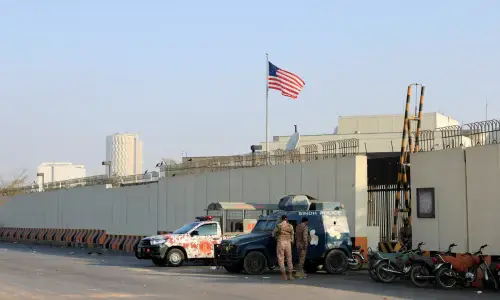Among many factors, the Pakistani state's protracted apathy and inaction on the issue of security has provided non-state actors the spaces to grow and expand their influence. They used these spaces not only to propagate their ideologies and narratives but also to establish a 'state within the state' in Pakistan's tribal areas.
Even as counteraction is now underway, the sudden rise of ISIS has threatened to make matters worse for us.
The militants are jubilant over the success of the Islamic State of Iraq and the Levant (ISIS), which has established a 'caliphate', or 'Islamic state' in parts of Syria and Iraq. This is not the first time militants have captured some territory and established their so-called Islamic writ.
Afghanistan, Pakistani tribal areas, Northern Mali and Somalia have experienced similar ventures by militants in the past, though on varying levels.
Rise of ISIS ≠ Fall of al Qaeda
Many experts see the decline of al Qaeda in the rise of ISIS, while analysing the recent developments happening in Iraq and Syria. That is a mistake.
A realistic review of militants’ strategies suggests that they first challenge the very foundation of the state by providing alternative socio-cultural and political narratives and then march onto its physical territory.
They may have differences over strategies, as ISIS and al Qaeda had, but ultimately they overcome their differences. Al Qaeda might feel stunned over the ‘victories’ of ISIS but now, instead of arguing with ISIS over strategies, will prefer to develop a consensus over a model of caliphate.
In some cases, militants develop alliances with nationalist groups.
That's what happened in Northern Mali, where the National Movement for the Liberation of Azawad (MNLA) had developed coordination with Islamist groups. But when they captured a territory, Islamist groups started imposing Shariah. The alliance was weakened due to ensuing infightings and eventually broke up after a military offensive was launched by the French forces.
A dangerous inspiration
Apart from group dynamics, inspiration plays an important role in militants’ efforts to replicate one success in other parts of the world.
The rise and success of ISIS could play a very dangerous, inspirational role in Pakistan, where more than 200 religious organisations are operating on the national and regional level.
These organisations pursue multiple agendas such as transformation of society according to their ideologies, the enforcement of Shariah law, establishment of Khilafah (caliphate) system, fulfilment of their sectarian objectives and achievement of Pakistan’s strategic and ideological objectives through militancy.
Such organisations could be influenced by the success of ISIS in various ways. A few would limit themselves to providing just moral support, but others might actively provide donations and financial assistance on ISIS' call.
Common purpose: Establish the state of Khurasan
Still others — mainly religious extremist and militant organisations — could find inspiration in ISIS' strategies and tactics.
This is possible since even groups operating in two different regions can find common ground in the Takfiri ideologies they believe in, and in the organisational links they share with each other.
The map released by ISIS shows countries for expansion marked in black across North Africa, into mainland Spain, across the Middle East and into Muslim countries of Central and South Asian region. It depicts exactly the states, which are or once remained under Muslim control.
According to this notion, the territory which has come under Muslim rule even once becomes a permanent part of Islamic caliphate. These territories, if later invaded by non-Muslims, will be considered as unjustly occupied territories and it will be obligatory for a Muslim to struggle to regain them.
Interestingly, the ISIS map shows both Afghanistan and Pakistan as part of the Islamic caliphate state's Khurasan province. Al Qaeda and its affiliates believe that the movement for the establishment of the Islamic state of Khurasan will emerge from the region comprising of the Kunar and Nuristan provinces of Afghanistan and Malakand region of Pakistan.
 |
| A map purportedly showing the areas ISIS plans to have under its control within five years has been widely shared online. As well as the Middle East, North Africa and large areas of Asia, it also reveals ISIS' ambition to extend into Europe. Spain, which was Muslim-ruled until the late 15th Century, would form part of the caliphate, as would the Balkan states and eastern Europe, up to and including Austria. |
They consider Khurasan as the base camp of international jihad, from where they will expand the Islamic state boundaries into other non-Muslim lands. Mullah Fazlullah of Swat was inspired by the notion and considered himself the founder of the Khurasan movement.
Many other groups and commanders in Pakistan and Afghanistan subscribe to the same idea, but only a few groups have dedicated themselves to the cause of establishment of the Islamic state of Khurasan.
The current TTP leadership — mainly Fazlullah and his deputy Qayum Haqqani, and Khalid Khurasani group in Mohmand and Bajaur agencies of Fata — are leading this movement, not only on the militant, but on the ideological front as well.
The concentration of al Qaeda and TTP hardliner groups in Kunar and Nuristan are of the same mind; they intend to use the territory as a base camp for the establishment of the state of Khurasan. Though they are not strong enough to trigger a massive militant campaign like the one going on in Iraq, they will remain a critical security irritant and keep inspiring radical minds in the region.
Though the North Waziristan military offensive is an attempt to damage militants’ operational baseline, at the same time it has forced the militants to assemble in Khost, Nuristan and Kunar regions, which are all places that seem more conducive for beginning a militant struggle toward the eventual establishment of their fantasised Islamic state.






























